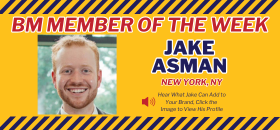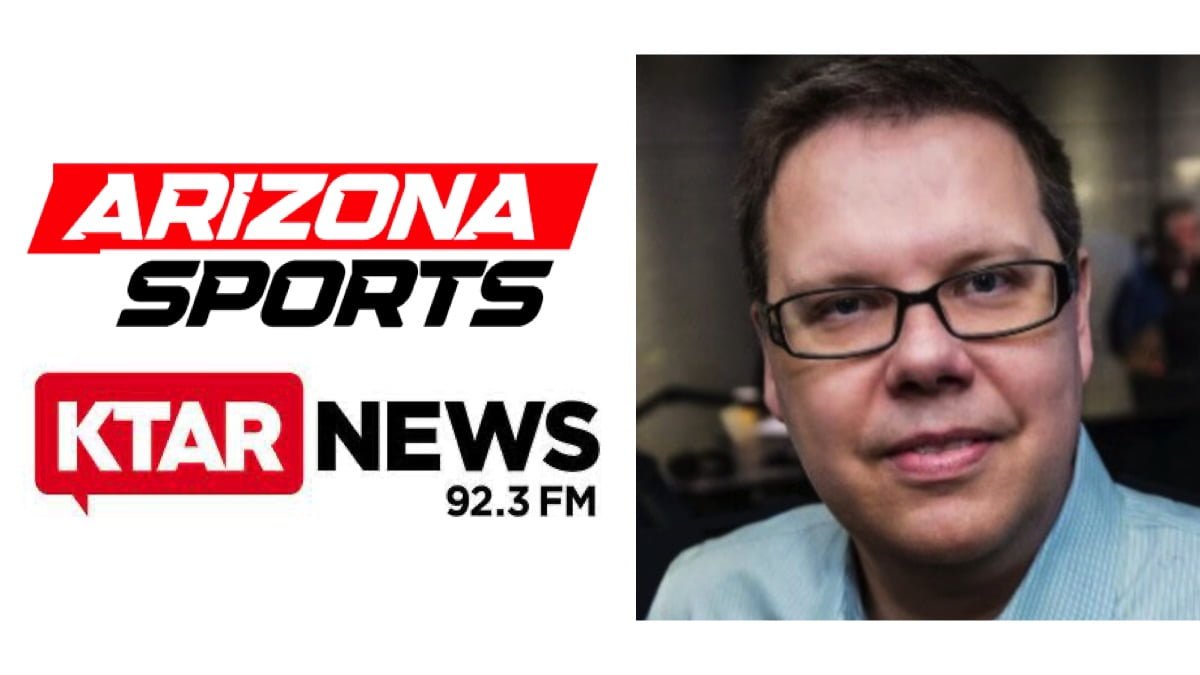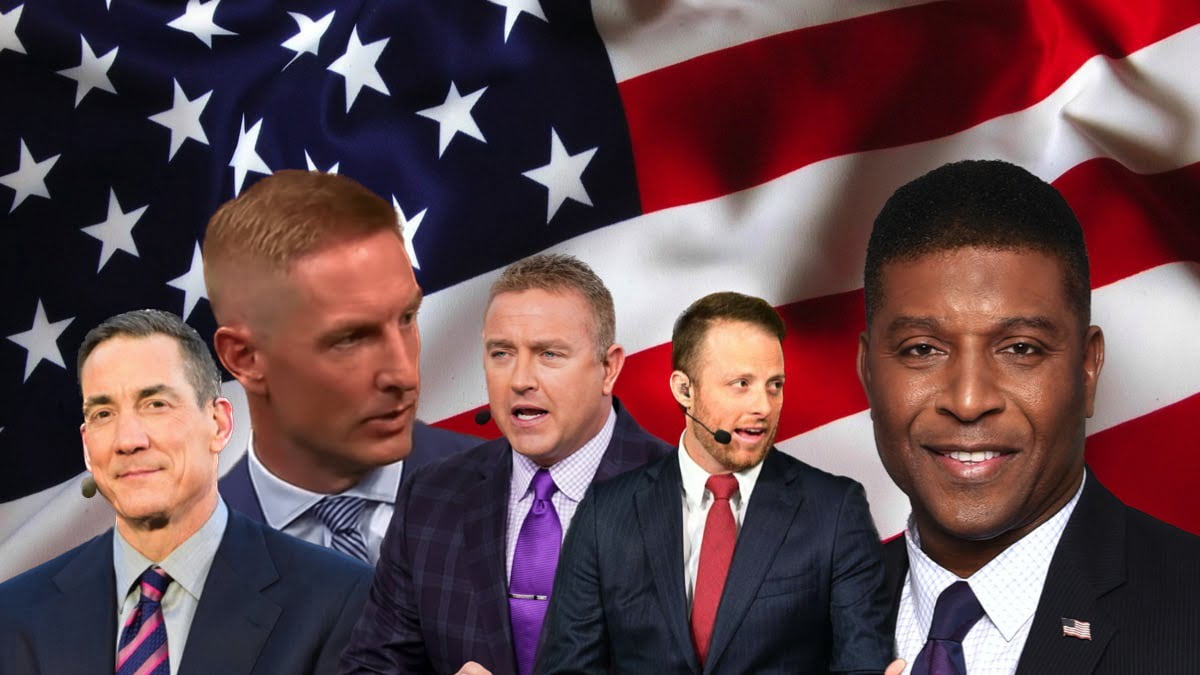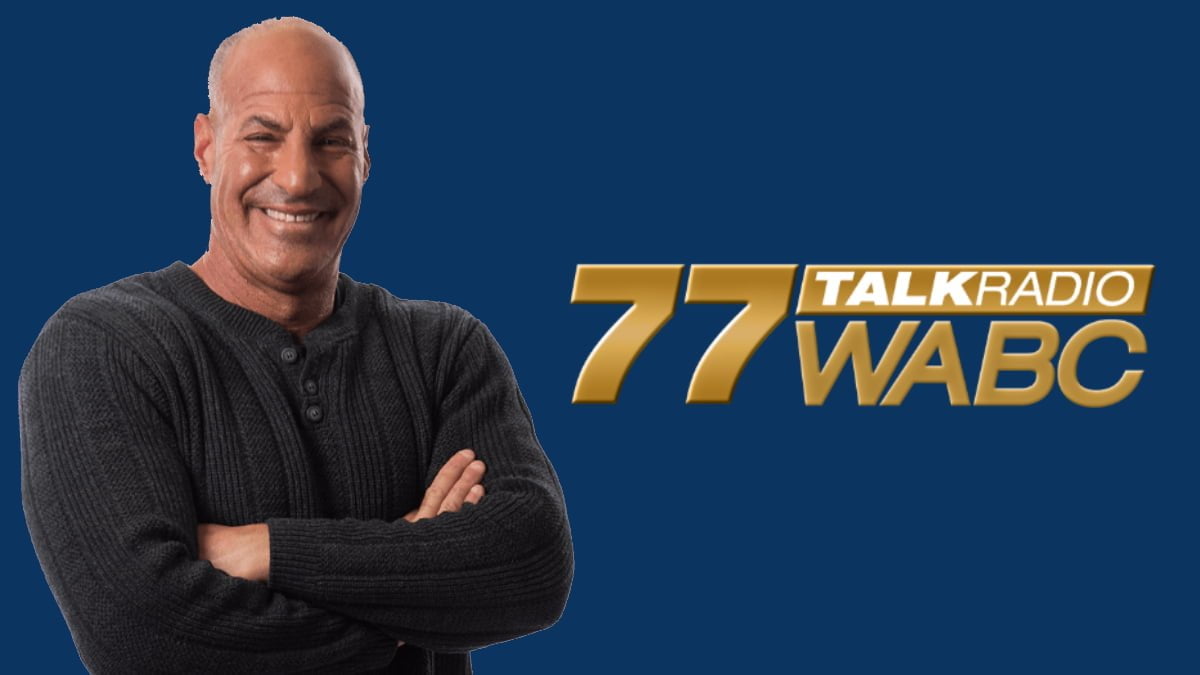There are a lot of similarities between coaching a football team and programming a sports radio station. The Denver Broncos didn’t say, “Although Tim Tebow is our quarterback, we’re still going to throw it 40 times a game.” No, they altered the system to get the best out of their personnel at that time.
It’s the same concept in sports radio. It takes a smart programming mind to put the talent in the best position to succeed. Being able to bend and adapt is a big part of the job.
Brian Long has done an exceptional job of tweaking his playbook throughout the years. He doesn’t call the same plays for different teams in different markets with different hosts. He adjusts. Smart people find various ways to win.
Long is now overseeing Arizona Sports and KTAR in Phoenix. He’s only a few weeks into his new job, and he’s starting to put the pieces together. Long talks about his process of programming a new station, which is a measured and insightful approach. Long also talks about the talents that made his job the easiest, and clearly has the right answer in the David Lee Roth vs. Sammy Hagar debate. Enjoy!
Brian Noe: When you’ve only been on the job in Phoenix for about a month, what do you try to get done initially when you’re brand new like that?
Brian Long: It really comes down to finding the people inside the building who have the institutional knowledge, the market knowledge. Obviously, Ryan Hatch, he had this position and is now the market president. There’s a lot I can lean on in terms of having some CliffsNotes to get up to speed. But really, right now, it was about just getting to know everyone’s name and listening. I’m still in that process. And start making incremental changes, setting up meetings and getting to know everyone, things like that. It’s very much listen and keep my mouth shut right now, just trying to get a feel for the radio station.
And to be fair, Brian, it’s not like change needs to happen. It’s a really, really talented lineup on both of these stations. As it relates to Arizona Sports, these are seasoned, smart people that have been doing really big things in the market for some time. So half of it is getting to know them and what motivates them and how they approach the show and their process.
I think it would be just crazy to walk into something and start saying, well, this is exactly how it’s going to be. Frankly, I’m learning from them at this point much more than they’re learning from me. Right now, you really are trying to get the backstory to how the shows, the producers, the process is making it work daily. Because it’s different. I’ve been in many different spots and they’re always different in how it comes about.
BN: One of the big football stories this offseason was Eric Bieniemy with the Washington Commanders. The head coach, Ron Rivera, just volunteered it by saying, yeah, some players have been complaining about his intensity and he hasn’t been a head coach so he doesn’t quite know how to switch gears. As it applies to programming, do you need to be able to switch gears with talent where sometimes you’ve got to kick them in the butt, and that works with some, or others you have to be more of a player’s coach? Do you need to have that ability as a programmer?
BL: If you were to ask me that 15 years ago, I would’ve probably had a completely different response. Maybe I was a little more fiery about it.
Right now, it’s about trying to meet them where they’re at, and taking them where we want to go. You have to gain that trust, you have to sort of feel your way. To say you don’t have to do it sometimes would be wrong. Of course, there are situations where there is a hard, fast rule on something, but most of the world we live in, and this business is pretty gray. If you can sort of find the way in which someone’s approaching it, it may change your perspective about it a little bit.
I’ve really learned over the years to not have biased ears. I know what I like, so everyone should like what I like. It’s like, that’s not really real. It’s not about what I like, it’s really what makes the audience tick. Just because it may not be my flavor, doesn’t mean that it doesn’t have value.
In the past, I would have definitely leaned more on, this is how I know it’s worked, so we’re going to do it this way and that’s how it’s going to work. And now, over the years of trial and error, you start to learn the fact of the matter is there’s a lot of ways to approach this, there’s a lot of ways to get there. It’s more entertaining intellectually when you’re adding something, they’re adding something, you’re sort of creating this thing together.
BN: With the hosts that pop, is there something that they share in common? Is there something foundational that you see with someone that’s a major talent?
BL: I think it’s just there’s an insatiable appetite to be great. Whether they’re the person sitting at the bar that everyone’s listening to, that’s holding court, or they’re on the air, they want it. I’ve yet to see someone who wasn’t trying to be better, be that person that’s just like, yeah, they just show up and roll out of bed and they’re great. It doesn’t happen like that.
Brian, you’ve worked with a lot of talent, and you yourself, we’ve had discussions about your process and what you put into it. If you’re working to be like, how can I be better than I was the day before? Even if it’s just like, hey, it’s a little bit of a mantra, it’s an aspirational thing. If you think that way, your mind will force yourself to try to think differently. I think if you’re always doing that, the great ones, they just instinctively do it. They’re always trying to move it forward somehow.
BN: Is there a talent over the years that made your job the easiest?
BL: Man, we’ve had a lot. That’s a tough question. Obviously, when I was in Los Angeles at ESPN, Colin was spending a lot of time out there. Let me be clear, he didn’t work for me, but he was using the building a lot. And to watch his process, it’s not shocking why he became as successful and great as he is.
Brock Huard, with Brock and Salk, was another person. He was a guy who attacked being great at the job much like being an athlete. He really attacked, like, I want to be a really great talk show host. Mike Salk was another one. The lineup in San Diego was a bunch of people who have really bought in. They actually made my job much easier because they really were sort of fighting as a collective for something. But if you’re saying independently, it would be those guys, Brock Huard, Mike Salk. I would definitely say Steve Mason and John Ireland were very instrumental in Los Angeles as well.
BN: What area do you think you’ve grown the most as a PD?
BL: Man, I figured out that I don’t know it all. I don’t approach it like I know everything. I’m coming up with my best pitch, and I try to really source it before I say it. I don’t swing from the hip anymore like I would in the past. If I think it’s right, it’s because I really genuinely think it’s right. And even when it’s wrong, I think people can sort of appreciate that like, hey, we had a great plan, but it didn’t work. It didn’t hit the way we thought.
In the past, I believed in myself a little too much. Maybe in my approach. Now I’m more like, man, I want to figure this out, and let’s figure it out together. So I’m leaning more on everyone around me than I am trying to just go it alone.
BN: It makes me think of when you’re a kid, sometimes you think you’re invincible. And there comes a moment where you think, oh, that’s actually not the case. I don’t know if you can pinpoint it. When you think about trying to pinpoint the moment when you were like, oh, wait, I don’t know it all, can you even think of when that moment was?
BL: Yeah, I don’t know that there’s a seminal moment. But I will tell you, Brian, I’ve had moments of, I’m sure this is going to work and it flamed out very badly. You look back and you’re like, wow, I was so sure that that was going to hit.
I’m a big culture guy, and I want the culture to reflect something I would want to be involved with, versus a top-down approach where it’s very, this is how it’s going to be, and if you don’t like it, hit the bricks.
As I said before, I really do want to try to meet everyone where they’re at, and take it in a direction that’s going to be successful for all of us. My job is to obviously figure out the strategy, but I feel it’d be ridiculous of me not to try to take what people think is success in their mind, and use that and build on it and try to craft it together, because you immediately have buy-in.
BN: What did you miss about Bonneville that brought you back to the company?
BL: Listen, I had a wonderful go in San Diego at iHeart, so it wasn’t anything that was like picking one over the other. Frankly, it was just the opportunity was right in the moment. Bonneville is a great company and iHeart is a great company. There’s a lot of really talented people doing talented things. I loved my time at iHeart. They really were fantastic to me. They treated me great and they were just good people to me.
I think here, there’s such a great opportunity and an area that was familiar to me. It’s very close to my home in San Diego. A lot of people from California live here in Arizona, so it wasn’t completely foreign to me. The opportunity to come back to work with Ryan, to work with a really special team, just proved the timing was right.
BN: I think the good PDs do a great job of not stepping in it. They don’t say things in a certain way where it leads you to believe, oh, maybe he’s saying this, or maybe he feels that. They do a good job of literally putting everything out in front of you where it’s clear and understandable. How big a part of the job do you think being good at that is?
BL: I think it’s almost everything. I try, Brian, to be as transparent as possible on all things at all times. There are moments where obviously you can’t. There are things that will happen that just from a business aspect wouldn’t be justified to share at the moment. But I try to let everyone know, everywhere, at every time, where they stand. I mean at all times where things are and what we’re doing because I think again, I’ve never seen just a PD make a station successful.
It’s the parts, it’s the talent, it’s the producers, it’s the board operators. People out there don’t care who the PD is. [Laughs] They care about who their favorite talent is. So the job is to get out of the way, build a strategy for success and let successful people become really successful.
BN: You’re programming both sports and news talk. What lessons from each do you bring to the other?
BL: I think the urgency and fun from sports. The immediacy that news can bring sometimes gets lost on sports because we can get a little rinse and repeat with our sports cycles. I think there’s lessons to glean from both depending on which one you’re focusing on at that moment. At the end of the day, it has to be entertaining, and it has to be impactful. If you can get those things done, then you probably have a pretty good chance at having some success no matter what the format is.
BN: How about your goals? Now that you’re back at Bonneville in Phoenix, anything that you have in mind as far as the next year or two that you’d like to accomplish?
BL: Only things that are laid out are for the station and to help grow it. The reasons they brought me here are to help grow it both from a ratings and revenue side. Try not to mess it up, that’d be my biggest goal. Try to assimilate myself into it and bring my experience to the table and offer it where it’s appropriate. And again, really try to get as much out of the talent — learning from the talent and the staff — as they’re going to get from me. There’s not one thing, like, I want to be this. Those things are more internal that we set out and we build metrics and decide this would be deemed a success or this wouldn’t.
BN: I think this is the most important question, totally on the record: how much better is David Lee Roth than Sammy Hagar?
BL: Well, we both know the answer to that. And the answer is, I want to say David Lee Roth is one of the top five frontmen of all time. I think he goes down on that. We’re gonna put Plant up there. I’m not putting Elvis in this because we’re talking about more contemporary hard rock. But you’re gonna put Plant in. You’re gonna put Steven Tyler in. Roth has got to be next.
Look, I hate panning on Sammy Hagar because I actually liked the Sammy prior. I just wasn’t into love songs and they turned into a love-song band. I think every hit they had, had love in it. With Roth, they were reckless, man. I think Eddie Van Halen described them as they were racing downhill and they pulled the brake. They were like falling down stairs as a band, but it somehow worked. They landed on their feet. There’s a lot to learn from that, Brian, their marketing, what they did to create themselves, there’s a lot of lessons that are appropriate for our world as well.
BN: I love that. I’m just thinking if both are quarterbacks, maybe David Lee Roth isn’t Tom Brady, he’s not the GOAT. Maybe he’s Peyton Manning, he’s top five. What’s Sammy? Is he Nathan Peterman?
BL: [Laughs] Nah, Sammy’s a player. Sammy’s probably — that’s a tough one — Dak. I give him Dak Prescott. He’s good. No one’s gonna say he’s not. I know all of my Texas friends will be tweeting after this and beating me up. That’s where I’d put him. Roth might be a little Lamar. There’s kind of a deficiency in his passing for some people, but he’s electric. That’s probably the better comp.
BN: I like that one. I love that we ended by going down this path.
BL: We could’ve done a half hour on that alone.
BN: How funny would it have been if one question was, hey, you’re back at Bonneville, yeah, it’s cool, and the rest was just David Lee and Sammy?
Brian Noe is a columnist for BSM and an on-air host heard nationwide on FOX Sports Radio’s Countdown To Kickoff. Previous roles include stops in Portland, OR, Albany, NY and Fresno, CA. You can follow him on Twitter @TheNoeShow or email him at bnoe@premierenetworks.com.








